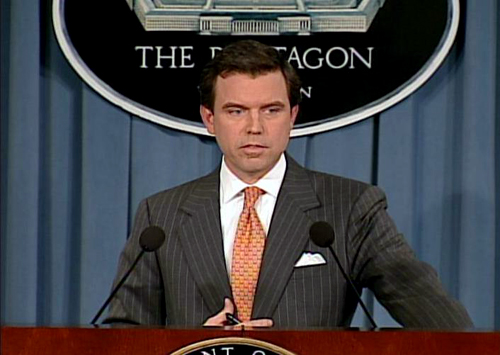Pentagon spokesman Geoff Morrell is hitting back against criticisms of the military’s Don’t Ask Don’t Tell survey, which was distributed to 400,000 members of the Armed Forces this week. Critics have blasted the survey for everything from its focus on the troops’ supposed feelings about showering with gay and lesbian colleagues to its use of the bias-engendering term “homosexual.” In a conference call with reporters this afternoon, Morrell was having none of it.
He began the call by insisting that the media didn’t have the full, 103-question survey (which, for the record, TPM did), and then transitioned to criticizing the groups that made the survey available to non-participants, saying that could “deter service members from participating” and “potentially skew the answers of those that choose to participate.”
Morrell also insisted that the questions with which most critics took the most umbrage — i.e., those related to lifestyle issues like socializing outside of work as well as showering and sharing barracks with openly gay and lesbian colleagues (as though that does not currently occur) — were developed as part of a process within the department and the working group to address the “privacy” issues of concern to heterosexual members of the military. Morrell said, “We think it would be irresponsible to conduct a survey that did not address these questions,” but insisted they were asked to help the military determine what adjustments might be necessary “when DADT is repealed.”
In response to questions from reporters, Morrell clarified that the survey responses could lead the military to conclude that it would “perhaps need adjustments to facilities themselves,” indicating that it is not outside the realm of possibility that, in order to preserve the privacy and modesty of heterosexual service members in group showers and barracks, the military would consider segregating gay and lesbian service members in some way.
When quizzed about the development of the survey questions, Morrell admitted that they didn’t consult with advocacy groups about the design of the survey, leaving that to the professionals at Westat, the private contractor who developed the questions in consultation with the Pentagon and working group.
Morrell stumbled through a line of questioning from The Advocate about the inclusion of the word “homosexual” in the survey which has been shown in surveys to bias responses. Morrell insisted that the survey used the term “only seven times” and only when the question required a yes or no answer. He then added:
We are well aware that homosexual is a loaded term, but it is a term that is in the law and policy… And it is a term that most people in our forces are familiar with.”
In fact, the first reference to gay and lesbian service members in the survey leads off with four of the seven questions that use the term “homosexual,” followed by a series of questions that use the terms “gay and lesbian.” Beginning such a series of questions with a term known to be “loaded” has the potential to prejudice the responses to the questions that use the unloaded terms. Two later questions that ask respondents to consider whether they have already bunked or showered with a gay or lesbian service member also use the term “homosexual,” potentially prejudicing the questions that follow about how the respondents would deal with such colleagues in the future.
Morrell insisted that questions that required yes-or-no answers used the term “homosexual” and those that required respondents to answer on a 5-point scale used the phrase “gay or lesbian.” In fact, there was one question that asked for yes-or-no answer that used “gay or lesbian.” That question, which was the last question of the survey, was:
Do you have any family members, friends or acquaintances who are gay or lesbian, or whom you believe to be gay or lesbian?
When asked whether the survey is flawed — because it asks service members to indicate whether they think gay and lesbian service members can or would negatively impact morale or preparedness but does not ask them whether it is because of the sexual orientation of the service members or the discriminatory policy that forces them to stay closeted — Morrell demurred. “I don’t know, and I’m hesitant to speculate. We were looking at issues of readiness and unit cohesion, if there are in fact issues associated with the discharge of members, I would think we would get to those in the question.” In fact, there is no place for service members to indicate the difference.
He promised to get an answer for us and, when he does, we’ll get it to our readers.






